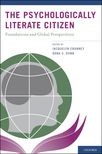 The Psychologically Literate Citizen: Foundations and Global Perspectives
The Psychologically Literate Citizen: Foundations and Global Perspectives
Contents
-
-
-
-
-
-
-
-
-
5 The Social Psychology of Intergroup Harmony and the Education of Psychologically Literate Citizens
-
-
-
-
-
-
-
-
-
-
-
-
-
Worthy Ends: Citizens and Moral Character Worthy Ends: Citizens and Moral Character
-
Worthy Beginnings: Community and Cultivating Justice Worthy Beginnings: Community and Cultivating Justice
-
Coming Full Circle: Serving the Community and Service-Learning Coming Full Circle: Serving the Community and Service-Learning
-
Author Note Author Note
-
References References
-
-
-
-
-
-
-
-
19 Psychological Literacy: Bridging Citizenship and Character
Get access-
Published:August 2011
Cite
Abstract
Building on Martin Luther King, Jr.’s claim that “Intelligence plus character… is the goal of true education,” this chapter explores the parallels between character development and psychological literacy. The chapter argues, in particular, that promoting the skills of psychological literacy must be balanced against principles of citizenship and community in order to avoid the dangers of instrumental reasoning. In this regard, fostering psychologically literate citizens has much in common with moral character. The chapter proposes service-learning as one strategy for building community and channeling the skills of psychological literacy toward the service of a common good.
Sign in
Personal account
- Sign in with email/username & password
- Get email alerts
- Save searches
- Purchase content
- Activate your purchase/trial code
- Add your ORCID iD
Purchase
Our books are available by subscription or purchase to libraries and institutions.
Purchasing information| Month: | Total Views: |
|---|---|
| November 2022 | 1 |
| December 2022 | 3 |
| April 2023 | 3 |
| July 2023 | 2 |
| November 2023 | 1 |
| June 2024 | 2 |
| December 2024 | 1 |

Get help with access
Institutional access
Access to content on Oxford Academic is often provided through institutional subscriptions and purchases. If you are a member of an institution with an active account, you may be able to access content in one of the following ways:
IP based access
Typically, access is provided across an institutional network to a range of IP addresses. This authentication occurs automatically, and it is not possible to sign out of an IP authenticated account.
Sign in through your institution
Choose this option to get remote access when outside your institution. Shibboleth/Open Athens technology is used to provide single sign-on between your institution’s website and Oxford Academic.
If your institution is not listed or you cannot sign in to your institution’s website, please contact your librarian or administrator.
Sign in with a library card
Enter your library card number to sign in. If you cannot sign in, please contact your librarian.
Society Members
Society member access to a journal is achieved in one of the following ways:
Sign in through society site
Many societies offer single sign-on between the society website and Oxford Academic. If you see ‘Sign in through society site’ in the sign in pane within a journal:
If you do not have a society account or have forgotten your username or password, please contact your society.
Sign in using a personal account
Some societies use Oxford Academic personal accounts to provide access to their members. See below.
Personal account
A personal account can be used to get email alerts, save searches, purchase content, and activate subscriptions.
Some societies use Oxford Academic personal accounts to provide access to their members.
Viewing your signed in accounts
Click the account icon in the top right to:
Signed in but can't access content
Oxford Academic is home to a wide variety of products. The institutional subscription may not cover the content that you are trying to access. If you believe you should have access to that content, please contact your librarian.
Institutional account management
For librarians and administrators, your personal account also provides access to institutional account management. Here you will find options to view and activate subscriptions, manage institutional settings and access options, access usage statistics, and more.